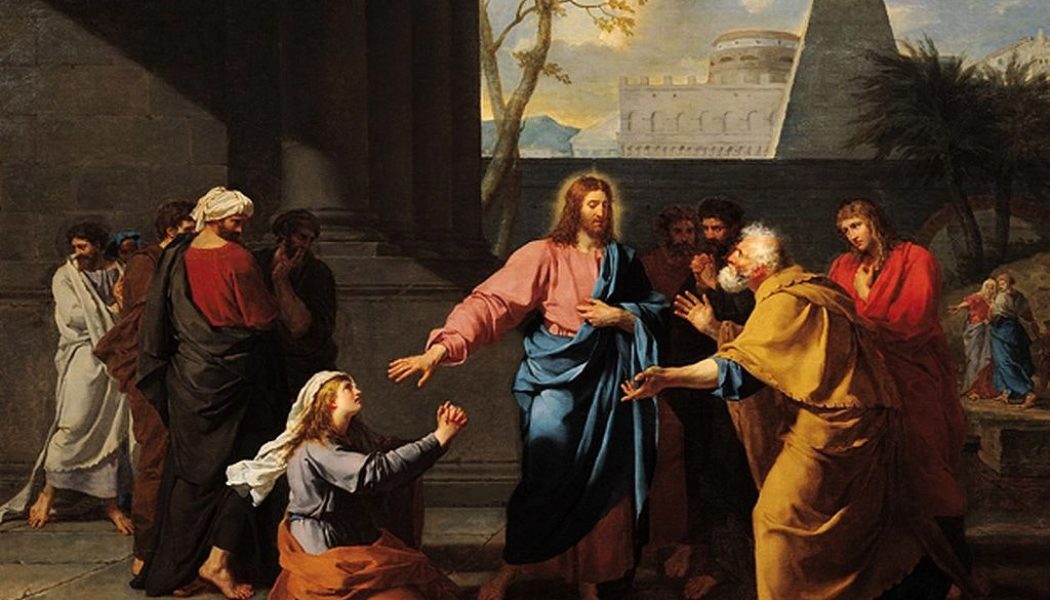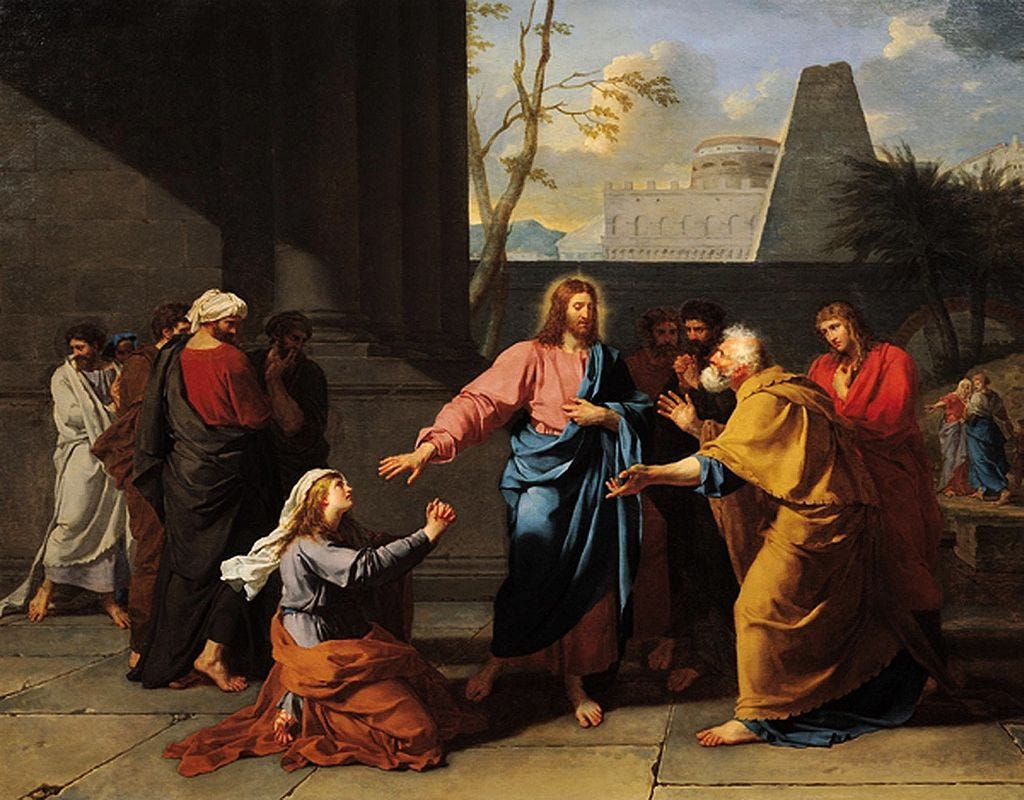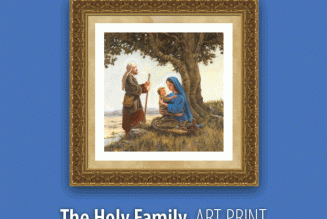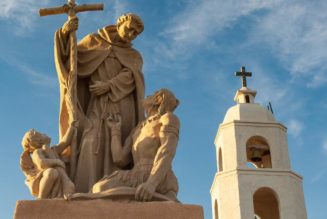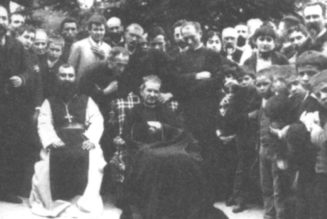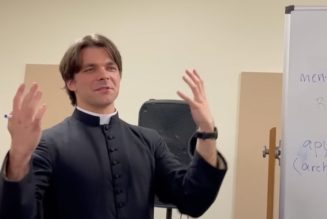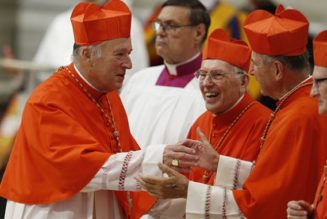This week’s gospel readings include the account of the Canaanite woman who approaches Jesus to beg for her daughter’s healing. I think it is fair to say that this passage is one of the most shocking scenes in the entire New Testament. It appears that Our Lord is simply ignoring this poor woman as we are told that “He answered her not a word.” Indeed, when she persists, Our Lord seems to insult her by telling her “It is not fair to take the children’s bread and throw it to the dogs.” She doesn’t argue, but merely replies “Yes, Lord, yet even the dogs eat the crumbs that fall from their master’s table.” At this humble acknowledgement, Jesus exclaims “O woman, great is your faith!
The primary lesson we ought to learn from this interaction is that God desires persistence in prayer; though it may appear He does not hear us, we may rest assured that nothing is ever, even for a brief moment, outside of His providence. But as with any encounter with Our Blessed Lord, there is always more for us to meditate upon.
The senses of scripture
Here we can distinguish between the four senses of scripture: literal, allegorical, moral, and anagogical. The moral sense sense of this passage is, as we have noted, that Our Lord desires us to persist in prayer. However, it it the anagogical sense—the sense that relates to the final things that I’d like to focus on.
In his commentary on this passage, St. John Chrysostom makes a crucial point that many modern biblical exegetes have failed to appreciate. He says,
Do you see the woman’s wisdom, how she did not venture so much as to say a word against it, nor was stung by other men’s praises, nor was indignant at the reproach? Do you see her constancy? He said, It is not meet, and she said, Truth, Lord; He called them children, but she masters; He used the name of a dog, but she added also the dog’s act. Do you see this woman’s humility?
Hear the proud language of the Jews. We be Abraham’s seed, and were never in bondage to any man; and, We be born of God. But not so this woman, rather she calls herself a dog, and them masters; so for this she became a child. What then says Christ? O woman, great is your faith.
Yea, therefore did He put her off, that He might proclaim aloud this saying, that He might crown the woman.
St. Thomas paraphrasing St. John says, “He knew what she would say, and would not have her so great excellence hid.”
What a lovely unexpected turn this story takes when viewed through the lens of the Church Doctors. Did Our Lord intend to denigrate the woman? The exact opposite. He knew the great faith of the woman, and was so moved by it, that he wished to crown her excellence so that every generation from that day until the end of the world would also know of it.
Fathers and mothers will proudly proclaim the talent, beauty, and goodness of their children to others. No matter how many times He tells us, sometimes we forget that God is our Father. Although the very idea seems impossible, it is nonetheless true that “those who act faithfully are his delight.” Imagine the all-powerful all-perfect God delighting in you. Yet, He tells us that he does. Once we accept this truth, and we begin to see God as a delighted Father, we can begin to understand why He crowns the Canaanite woman: His desire is to not let one single act of goodness, truth, and beauty go unheralded. He makes this desire even more explicit when he says of Mary Magdalene anointing him, “Truly, I say to you, wherever this gospel is preached in the whole world, what she has done will be told in memory of her.”
We are told that after Our Lord crowns the woman’s great faith, that her daughter was immediately healed. This then, it seems to me, is the anagogical meaning of the text: that at the end of all things, when all men are called to final judgement, we will finally learn of all the prayers, all the penances, all the faith, and all the works of mercy of every man. In turn, we will see God’s mercy and grace of God working in us, and through us.
The furthest consequence
In addition to all of our good works, we will also behold all of our bad actions. Every commandment broken, every offense in thought, word, or in deed. However, we will see things not simply as a kind of video being played back. Nor will we merely see the lives of others played out. Yes, we will see those things. But this view is still vastly limited. How so? Suppose you could record your entire day and then watch the video the following day. Have you seen all there was to see? Not at all. What is missing is the effect you had on others. And the effect they had on others, and so on. The Catechism tells us that, “In the presence of Christ, who is Truth itself, the truth of each man’s relationship with God will be laid bare. The Last Judgment will reveal even to its furthest consequences the good each person has done or failed to do during his earthly life.” Sin and virtue seem so small in the moment, that it is easy to miss that they have near infinite, and sometimes eternal, repercussions.
We are called to meditate on the four last things: death, judgement, heaven or hell. Judgement in this case not only means our particular judgement, but the Last Judgement. Remembering the “furthest consequences” ought to spur us to act with charity and mercy to others, rather than with disdain and wrath. We simply cannot comprehend the good that may be accomplished by what is a seemingly small act of virtue. Nor can we know the amount of evil that may result by what seems to us a trifling fault. That the furthest consequences of our failings are kept from us in this life is yet another of God’s graces. “If you, O Lord, should mark iniquities, O Lord, who could stand?”
The word we choose to speak
I am reminded of a scene in The Lord of The Rings where Gollum is on the very brink of repenting. For a brief moment, he beholds the Hobbits sleeping, and looks on Frodo fondly. This is the exact moment where his salvation hung in the balance. And at that moment, fraught with meaning, Sam awakens and speaks harshly to Gollum—and he is lost forever. In that moment, Sam saw Gollum as a monster, and that he was, but he desired, just briefly, for a moment, to be a friend.
Though we are not aware of them, there are no doubt many of these moments in our lives; times when others may be within a hair of repentance, and their decision may come down to the word we speak to them: “monster” or “friend.” God grant that at the Last Judgement, as the pages of our stories intertwine, we greet them as old friends.
The words we hope to hear
In the end, for those that are saved by the mercy of God, their friends will number more than we can imagine. Friends born centuries before them, and perhaps centuries after. But God will make them known—for He is a Father who delights in his children and would not have their good deeds go unknown.
Nor will He fail to show how much He loved us.
As we behold the faults of the entire world, we will marvel at the grace, mercy, and providence that God exercised in order to bring us safely home. And why would He do this? For no other reason than to delight in us and allow us to delight in Him. May we all hear the words said to the Canaanite woman, “O child, great is your faith!”
Join Our Telegram Group : Salvation & Prosperity
